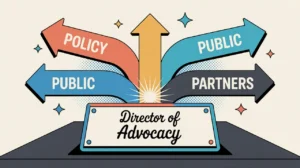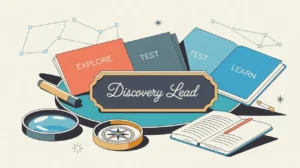What Does the Director of Strategy Role Involve?
A director of strategy is responsible for shaping, guiding, and coordinating the organization’s strategic direction to ensure alignment between mission, goals, and operational execution. This involves leading strategic planning processes, analyzing internal and external trends, supporting decision making with evidence and foresight, and ensuring that strategic priorities are translated into actionable plans across the organization. The role typically sits within the executive or strategy function and works closely with the chief strategy officer, chief executive officer, and other senior leaders. In both nonprofits and social enterprises, directors of strategy play a pivotal role in helping organizations navigate complexity, allocate resources wisely, and position themselves for long-term impact.
At What Level does this Role Operate?
Executive Level: This role typically reports to the chief strategy officer or chief executive officer. It involves leading strategic planning cycles, managing strategy teams, advising leadership on organizational direction, and coordinating cross-functional initiatives to align operations with strategic priorities.
Relative Employability: Director of strategy roles are increasingly in demand across nonprofits, social enterprises, philanthropic organizations, and international NGOs. As organizations operate in rapidly changing environments, strategic leadership has become essential to maintain relevance, coherence, and agility.
Relative Pay Scale: Within nonprofits and social enterprises, director of strategy roles sit in the executive pay bands, reflecting their strategic influence, leadership responsibilities, and close involvement in organizational decision making.
What are the Key Responsibilities and Activities?
- Lead the organization’s strategic planning processes, ensuring alignment with mission, vision, and operational priorities
- Conduct internal and external analyses to inform strategic choices, including market, policy, financial, and impact assessments
- Work with leadership to define and update strategic goals, objectives, and performance indicators
- Coordinate cross-functional teams to ensure strategy is translated into operational plans and measurable outcomes
- Monitor progress toward strategic goals and provide leadership with timely insights and recommendations
- Identify emerging trends, opportunities, and risks to inform adaptive strategy development
- Facilitate strategic discussions and decision-making processes with leadership and boards
- Manage strategic initiatives, special projects, and organizational change efforts
- Build strategic capacity within teams through tools, frameworks, and advisory support
What Core Competencies and Qualifications are Needed?
Required Qualifications and Experience
The following reflect common qualifications and experience expected for this role, while recognizing that pathways may vary by context, organization, and region.
- Relevant academic background in business administration, public policy, international development, economics, or a related field, or equivalent professional experience
- Extensive experience in strategy development, organizational planning, or leadership advisory roles
- Strong analytical, facilitation, and communication skills
- Proven ability to lead cross-functional teams and influence decision making at senior levels
- Excellent understanding of organizational dynamics, systems thinking, and change management
Key Competencies
- Strategic planning and foresight
- Analytical thinking and problem solving
- Cross-functional coordination and implementation oversight
- Facilitation and leadership advisory
- Monitoring, evaluation, and adaptive management
- Communication and strategic framing
How are AI and Automation Shaping this Role?
An AI-native director of strategy will look to AI and automation to improve foresight, analysis, and strategic decision making. They can use AI tools to model scenarios, analyze large datasets, identify emerging trends, and generate insights that inform strategic choices. Automation can support progress tracking, reporting, and coordination of strategic initiatives, allowing strategy leaders to focus on high-level analysis and decision facilitation. By integrating AI thoughtfully, directors of strategy can make strategy development more evidence-based, responsive, and forward-looking.
What Career Pathways and Transferable Skills are Associated with this Role?
Director of strategy roles can lead to positions such as chief strategy officer, chief executive officer, or other senior executive positions. The skills developed in strategic planning, systems thinking, leadership advisory, and organizational foresight are highly transferable across nonprofits, social enterprises, philanthropic organizations, government agencies, and private sector entities. This role provides a strong platform for shaping organizational direction and long-term impact.







